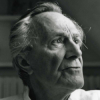Jean-Francois Lyotard

Jean-Francois Lyotard
Jean-François Lyotardwas a French philosopher, sociologist, and literary theorist. His interdisciplinary discourse spans such topics as knowledge and communication, the human body, modernist and postmodern art, literature and critical theory, music, film, time and memory, space, the city and landscape, the sublime, and the relation between aesthetics and politics. He is best known for his articulation of postmodernism after the late 1970s and the analysis of the impact of postmodernity on the human condition. He was co-founder of the International...
NationalityFrench
ProfessionPhilosopher
Date of Birth10 August 1924
CountryFrance
Our working hypothesis is that the status of knowledge is altered as societies enter what is known as the postindustrial age and cultures enter what is known as the postmodern age.
And today more than ever, knowing about that society involves first of all choosing what approach the inquiry will take, and that necessarily means choosing how society can answer.
Even now it is no longer composed of the traditional political class, but of a composite layer of corporate leaders, high-level administrators, and the heads of the major professional, labor, political, and religious organisations.
What is new in all of this is that the old poles of attraction represented by nation-states, parties, professions, institutions, and historical traditions are losing their attraction.
On the other hand, in a society whose communication component is becoming more prominent day by day, both as a reality and as an issue, it is clear that language assumes a new importance.
He was too tough to experience disappointments and resentments - negative affections. In this nihilist fin de siècle, he was affirmation. Right through to illness and death. Why did I speak of him in the past? He laughed, he is laughing, he is here. It's your sadness, idiot, he'd say.
Knowledge is and will be produced in order to be sold, it is and will be consumed in order to be valorised in a new production: in both cases, the goal is exchange
One knows that frontal and/or profile photography is torn to pieces... Inversely, what remains of the photograph must be seen as a fragment coming to fill a gap in the drawing.
Scientific knowledge is a kind of discourse.
Liberalism does not preclude an organisation of the flow of money in which some channels are used in decision making while others are only good for the payment of debts
If we wish to discuss knowledge in the most highly developed contemporary society, we must answer the preliminary question of what methodological representation to apply to that society
What guides Marxism, then, is a different model of society, and a different conception of the function of the knowledge that can be produced by society and acquired from it
Eclecticism is the degree zero of contemporary general culture: one listens to reggae, watches a western, eats McDonald's food for lunch and local cuisine for dinner, wears Paris perfume in Tokyo and retro clothes in Hong Kong; knowledge is a matter for TV games. It is easy to find a public for eclectic works.
The ruling class is and will continue to be the class of decision makers